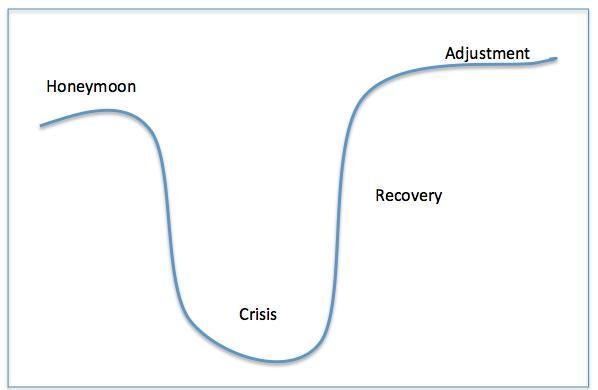Adapting to a new environment takes time, and the pace of transition varies from person to person. The typical pattern of cultural adjustment often consists of distinct phases: Honeymoon, Crisis ("Culture Shock"), Recovery, and Adjustment. Note that this cycle is repeated upon re-entry to one's home country or culture of origin.

Most people who travel to foreign countries experience some form of culture shock. Culture Shock is usually defined as feelings of discomfort occurring when immersed in a new culture. In some cases, the traveler cannot pinpoint all of the things in the new environment that are bothering him or her; the person simply feels that something is not right. In other cases, the traveler knows what has triggered culture shock; anything from the tiny differences in how people handle everyday tasks, feelings of incompetence when dealing with unfamiliar situations, frustration with an unfamiliar bureaucracy, or the feeling that the traveler cannot "connect" emotionally with people from the new culture.
Symptoms:
- Depression
- Loss or Gain of Weight or Appetite
- Insomnia
- Withdrawal from Social Activities
- Anger over minor frustrations
- A desire to return home
How to deal with Culture Shock & Cultural Adjustment?
Some people will get over their culture shock in a few weeks; others will take longer to adjust. You may experience culture shock immediately after arriving in the United States, or you may struggle with culture shock later, when many small frustrations have built up. We suggest that the best way to deal with culture shock is:
- Get Involved! Participate in activities on campus, such as those offered by the Dashew Center programs! Stay busy!
- Socialize with other international students who can understand what you're going through.
- Keep an open mind and try to be patient both with Americans and with oneself.
- Learn about the culture you are getting adjusted to (in this case the American Culture).
- Not to withdraw from others and be alone (spending time with other people is very important when adjusting to a new environment).
Find Support:
Becoming a UCLA student:
- The Student Affairs Website is a great resource to learn and become more familiar with life at UCLA.
- Be Well Bruin (find any resources within UCLA)
Specific student support & wellness:
- Counseling, Mental Wellness & Psychological Resources: Read our full page created for you!
- Case Management Services: Dashew Center has an in-house case manager to assist you: Hillary Thomas. Hillary serves the UCLA community by helping international students in distress connect with campus resources and needed support in order to succeed academically, socially, and emotionally. She supports the campus by consulting about how to respond to and refer students in crisis. Contact her by filling out this form.
-
UCLA CAPS Counseling and Psychological Services: UCLA Counseling & Psychological Services(CAPS)
- Staff and Faculty Counseling Services (for scholars): Campus HR Staff and Faculty Counseling Webpage